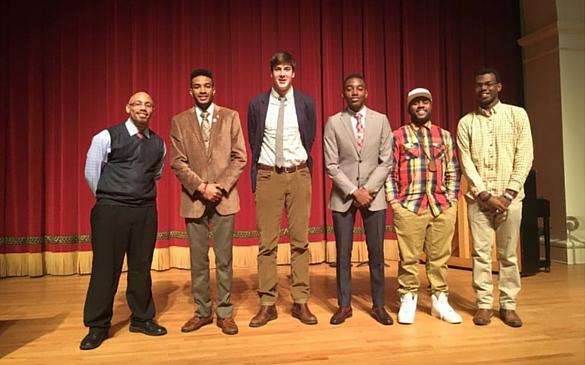By: Sarah Madden, Senior Writer
“People don’t expect these kinds of events at Wofford. It wasn’t just black or just white students [performing], it wasn’t just frat people, it was a big melting pot of people coming together and learning to respect each other more,” Tyrell Long, ’16, says of the Holding Thorns poetry reading held Feb. 23 in Leonard auditorium.
When freshman Wofford student Grant McClure of Sigma Nu reached out to members of Kappa Alpha Psi to collaborate on a poetry reading for Black History Month, he hoped to show unity between two very different fraternity organizations and start a larger conversation on race relations at Wofford.
“I like to think that Sigma Nu is one of the most progressive fraternities on campus, but ultimately, our spiritual founder is a confederate general, so I wanted to find ways to question our foundation. I also wanted to recognize and validate Kappa Alpha Psi as a fraternity on campus, to improve the reputation of Greek life on campus and to get a conversation started.”
There were about a hundred attendees at the event, which featured readings by Wofford students but also performances from local artists from Spoken Word Spartanburg, including Rashad Gault, who performs as Blaq Socrates. McClure selected the poems read by students, including prominent African-American poets such as Rickey Laurentiis, Nate Marshall and Terrance Hayes.
Alex Hardy, ’18, of Kappa Alpha Psi says that the turnout exceeded his expectations, and he was encouraged by the way the poetry created a safe environment for a tough topic: “A lot of people are hesitant to discuss race, but this was a very neutral environment. It was great art, and that’s something anybody can appreciate.”
Hardy spent two or three weeks preparing for the event and says he found watching videos of other performances helped him give life to the poems he was reading.
“I loved my pieces, too, but I think ‘Southern Gothic’ read by my frat brother Tyrell was really passionate and had a lot of meaning behind it. Once that poem was read, it led into a lot of things that needed to be discussed. It broke the ice, so to speak.”
“It was really important for me to get black men to read these poems,” says McClure. “Ultimately, it’s not a white man’s place to be voicing these opinions, so I was really impressed by the power of [the] readings.”
McClure read two selections of his original works, both concerning his privilege as a white man compared to the violence and injustice he sees in the world.
“Wofford is making serious strides to improve race relations, but it’s such a balance to keep,” says McClure. “For instance, Greek life is so integral to Wofford, but many of these organizations have histories of associating with racism. [I’m thinking], how can we find ways to move forward from that, when people are trying so hard to hold on to that skewed heritage?”
In addition to the poetry readings and the spoken word performances, the newly-re-formed gospel choir debuted with a performance by nine of its members. Long, a senior, was encouraged to see the group return to campus.
“Seeing the gospel choir perform after dying out my freshman year showed how Wofford is making an effort to provide things that make all students feel included.”
Jonathan Franklin, ’16, performed as both a reader and chorister and says that the event broke a trend of silence: “Unfortunately, we are not discussing race openly on campus, but this is a stepping-stone.”
In the future, McClure says he hopes to see more collaboration between fraternities, “especially other fraternities validating and embracing the African-American students.”
He says this works on multiple scales: “I know that before the reading, many Sigma Nu brothers didn’t know Tyrell or Alex, but now they have a connection there… Others can build on that connection.”
Long, like McClure, emphasizes personal relationships.
“If you partner with people,” he says, “the effect trickles down. If you bond with people that are very different than you, other people can build on that relationship.”
“This kind of collaboration between these fraternities is not something usually seen at a predominately white institution,” says Franklin. “I hope that this will inspire other Greek organizations on campus to collaborate with Kappa Alpha Psi, Omega Psi Phi, or even other organizations under the Office of Diversity and Inclusion to host programs on campus.”
Hardy says that all the feedback he got from the event was positive: “People want more environments to talk about tough issues like this. And that’s exactly what I hoped for this event. It’s so important to give people this kind of space.”
“Willingness to discuss these topics depends upon support. Nobody wants to talk about these things if they feel like they will be judged, but support and validation of feelings makes conversation possible,” says Hardy.
Long sees this kind of environment as a crucial vector for building unity on campus.
“This is one campus with one population of students, and this kind of event helps break those barriers down.”





























